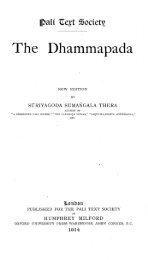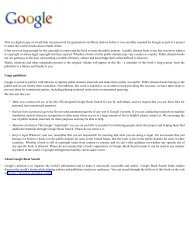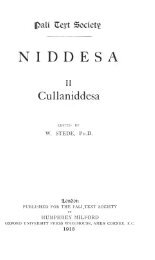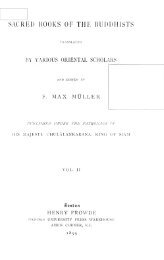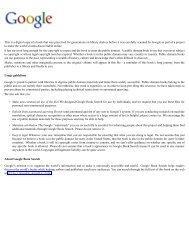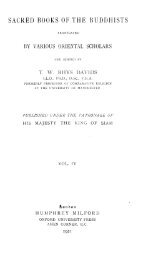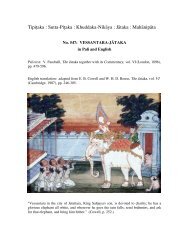Lessons In Practical Buddhism - Sirimangalo.Org
Lessons In Practical Buddhism - Sirimangalo.Org
Lessons In Practical Buddhism - Sirimangalo.Org
Create successful ePaper yourself
Turn your PDF publications into a flip-book with our unique Google optimized e-Paper software.
Buddha is said to have had a peculiar habit called the<br />
elephant’s gaze; instead of turning his head to look at<br />
something, he would, like an elephant, turn his whole body,<br />
giving the object his full attention. If we wish to follow in the<br />
Buddha’s footsteps, we should always strive to give our full<br />
attention to one thing at a time, rather than seeking to take<br />
in everything at once. At the very least, taking in too many<br />
things at once will cause undue mental distraction, leading<br />
us to lose our focus on the reality of our experience. While it<br />
is true that ephemeral pleasure can be gained from seeking<br />
out pleasant objects of the sense, such seeking is antithetical<br />
to the attainment of true happiness. One should ask oneself:<br />
if I am truly happy, for what reason must I seek pleasure?<br />
If we wish to find true happiness, we should strive to focus<br />
on what we are doing in every aspect of our everyday lives,<br />
rather than dreaming about what we would rather be doing,<br />
or what others are doing in the world around us. Rather than<br />
trying to find happiness in what we don’t have, which only<br />
leads us to develop habits of seeking, chasing, craving and<br />
clinging, we should try to find happiness with what we do<br />
have, so that we can be happy at any time, place, or<br />
circumstance. We should remember this in our daily lives<br />
and throughout our practice as Buddhist meditators, knowing<br />
that every sense pleasure we indulge in and every aversion<br />
we allow ourselves to cultivate will contribute to the soiling<br />
of the mind, rendering the cultivation of insight that much<br />
more difficult.<br />
Guarding the senses is something we should take seriously.<br />
When we walk, we should focus on walking; when we stand,<br />
sit or lie down, we should likewise try to focus on that<br />
activity without letting our minds wander. Whatever we do<br />
during that day – speak, listen, work, drive, eat, drink,<br />
shower, even urinate and defecate, we should focus on what<br />
we are doing, not letting ourselves become distracted by<br />
what is being done around us. A person who guards their<br />
mind in this way will find themselves refreshed and alert,<br />
free from the exhaustion that besets one whose mind is<br />
given free reign to indulge in the objects of the sense –<br />
enslaved, rather, to the terrible masters of desire and<br />
aversion.<br />
36



